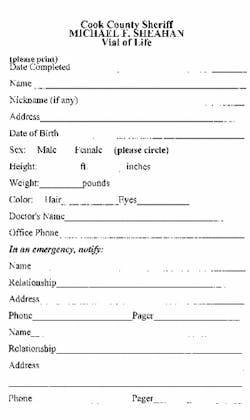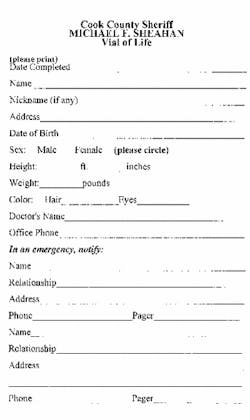How Can We Help Them?
by Sheri B. Doniger, DDS
One method for aiding emergency professionals is to advise patients to wear 'jewelry' that provides an alert about medical conditions. In addition, local agencies may have a registration program that helps track medical conditions of citizens.
In addition to caring for the dental health of our patients, we have the unique opportunity to expand our focus to caring for their overall welfare. We see an average of eight to 10 patients a day. After the initial pleasantries, our first question inevitably is, "Have there been any changes in your medical history?"
Our patient population is diverse. We see grade school children with basic allergies to strawberries, and we treat seniors with a plethora of conditions ranging from arthritis to xerostomia. As part of our care, we should be introducing patients to the variety of medical alert warning programs available to protect their personal welfare.
My interest in this stems primarily from my family. My father has had valve replacement surgery, a hip replacement, and a myriad of other conditions that would need to be known immediately if he were to be in an accident.
We see patients like this on a daily basis. We know to schedule Mrs. Powell in the morning because it is less stressful to her cardiac condition and Mr. Bloor around his insulin doses. How many times do we suggest a program to patients that will assist them in case a catastrophe occurs and they are found unconscious in a movie theater or grocery store?
Medical alert programs are available through many sources. Several companies sell jewelry that can be engraved with the patient's medical conditions. The jewelry has several styles (ID bracelets, charms, medallions, or pendants) for both adult and children available at various costs. Some offer membership programs to augment the jewelry that is current and accessible to medical personnel via fax, telephone, or the Internet. Metal wallet cards are also engravable through some sources. Local hospitals sponsor programs that have small wallet cards with pertinent medical information that is tied to national databases.
One company offers a "panic pendant" button and console. The device can call 911 or three additional numbers pre-programmed in case of an emergency. This device is great for the recuperating, long-term hospital care patient, the homebound, the less mobile, or the elderly who live alone.
The related chart offers more detailed descriptions of these types of programs.
The watchful eye of local government
Our local police department has several programs, targeted to seniors. Officer Sandy Martin of the Lincolnwood Police Department said seniors have choices for participating in these health and safety programs. The police and fire department not only have pertinent medical information on file, but they are aware of the resident's living status.
The home emergency listing program (HELP) sends officers to check on our senior residents. The resident registers information with the village, enabling the police to be aware of phone numbers, next of kin, key holders, and any pertinent medical information in case of an emergency.
Additionally, Lincoln-wood has a Citizens' Emergency Identification Bracelet Program. Senior residents or residents with disabilities have emergency information on file at the police department. They are issued a confidential code number, which is located inside the bracelet, along with the phone number of the police station. If something happens to the resident, a quick phone call to the police department will access pertinent emergency information to the authorities. Notice the examples of the registration forms within this article.
Other programs include the county-sponsored "HELP" (Helpful Emergency Lifesaving Packet). Through the Cook County Sheriff's department, a packet including the folllowing is provided to those who request it:
- An instruction sheet
- A vial (called vial of life) that is placed in the refrigerator (recommended location), or a tie-wrap bag with a sticker to be placed on the front door and on the refrigerator to alert medical personnel that the resident is a program participant
- Two sheets with important medical information that are inserted into the vial or pouch
- Two wallet cards for personal medication records - which include a listing of all medications the patient is taking - listing allergies, emergency contacts, pharmacist and insurance numbers. The pertinent information is inserted into the vial and placed in the refrigerator.
Some townships issue "hang bags" or pouches rather than vials. The recipient is instructed to tie the bag onto a phone cord or someplace they can easily find it. In case of emergency, the EMS personnel from that specific community would know to look for these pouches tied onto phone cords or in other prominent places in the kitchen or near the patient.
This places the information where the patient or caregiver can see it and point to it, if unable to communicate verbally.
Lincolnwood and Cook County are not unique in providing residents with personal security programs. To find out what is available in your area, make a quick phone call to your local police or sheriff's department.
These programs can easily be incorporated in your routine. All of the companies will forward informative brochures to display in the office. There is no charge to request these life-saving items; and with local- or county-sponsored programs, the services may be free of charge.
We need not promote one company over another but offer patients choices of programs that are available. Our office has implemented a wallet card to list medications. It is available to all patients as part of our patient-care program.
For the college student with athletically induced asthma to the senior with congestive heart failure, we can expand our service to patients by recommending these medical alert programs. In our fast-paced, changing world, immediate access to critical health information could be the difference between life and death. It's a great public service to offer patients the information they need for making a choice about their personal safety.
The author wishes to acknowledge Officer Sandy Martin and Mrs. Mary Liss of the Lincolnwood Police Department for their time and assistance; Ms. Laurie Roche and the Cook County Sheriff's Department Community Service Division, for their kind permission to demonstrate their documents in this article; and her father, Irving, for being an active participant in the Medic Alert program for more than 25 years and a true supporter.
Sheri B. Doniger, DDS, practices in Lincolnwood, Ill. She graduated from the University of Illinois College of Dentistry in 1983 and obtained her bachelor's degree in dental hygiene from Loyola University of Chicago in 1976. She can be reached at (847) 677-1101 or [email protected].

